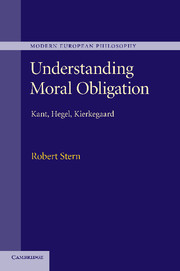Introduction
Published online by Cambridge University Press: 05 January 2012
Summary
My hope for this book is that it will shed light on the issues discussed at two levels: at the level of the history of ideas, in showing the role these issues have played in the thought of Kant, Hegel, and Kierkegaard, and their period more generally; and at the philosophical level, in helping us to understand these issues more clearly in a systematic way.
As regards the first, more historical, level, my aim is to offer an account of a central strand in the history of modern ethics from the mid eighteenth to mid nineteenth centuries, an account which differs from what I think has become the standard story. According to this story, a new turn in ethics is taken when Kant (in part foreshadowed by other figures such as Rousseau) introduces a radical notion of autonomy into ethical thinking, whereby autonomy is seen to require that all forms of moral realism are rejected; this ‘argument from autonomy’ (as I will call it) is then said to lead Kant to replace this realist conception with one whereby ethics is now grounded in the self-legislating moral subject. However, despite its appeal to the modern mind, this picture of self-legislation is seen to raise certain fundamental difficulties, particularly the threat of emptiness: if no prior set of moral values obtain, what is to guide the legislating subject, and to prevent the act of legislation from becoming groundless? It is this problem and related ones that are said on the standard story to constitute what is sometimes called the ‘Kantian paradox’, where this paradox is supposed to set the agenda for Kant’s successors, such as Hegel and Kierkegaard.
- Type
- Chapter
- Information
- Understanding Moral ObligationKant, Hegel, Kierkegaard, pp. 1 - 4Publisher: Cambridge University PressPrint publication year: 2011

